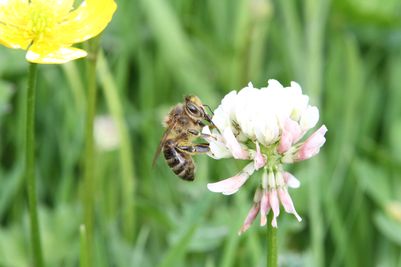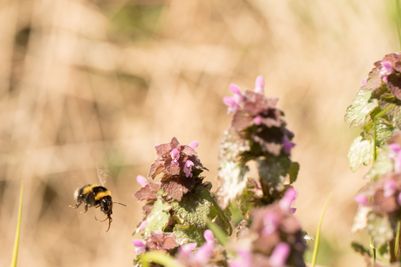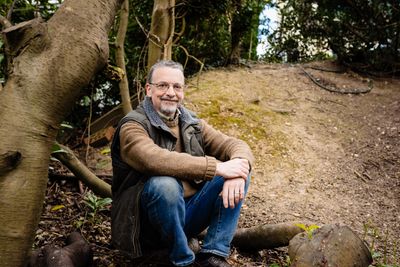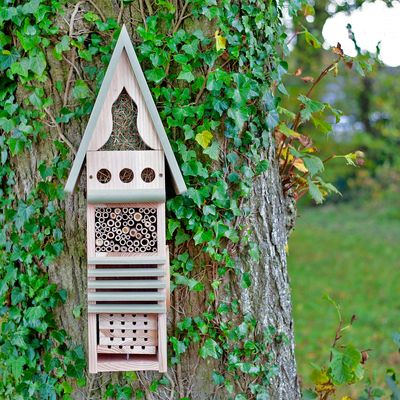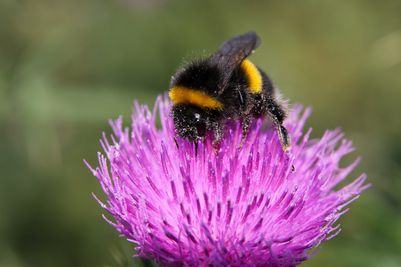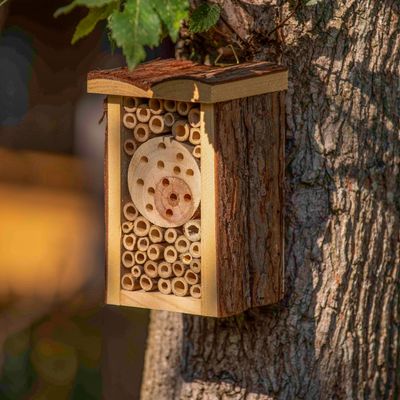It’s un-bee-lievably easy to help out Britain’s bee population!
Published:
Read Time: 4 mins
Sean McMenemy, passionate nature expert and founder of Ark Wildlife, shares some advice on how to spot the UK’s most common bee species, and how to help them thrive:
“We all know that bees play a massively vital role in our ecosystem, pollinating our plants which support other insects, which in turn support birds, bats, mammals, and everything further up the food chain, too! also no secret that bee numbers are struggling, so we should all be doing all we can to look after them! Thankfully there are plenty of small steps we all can take to help our buzzing friends out.
Solitary versus social species
“First, let’s look at the different species out there. Social species like bumble bees and honey bees are the types we’re probably most familiar with. They live in colonies ruled by a queen, and sting when they feel their hive is in danger. Bumble bees have rounder, fuzzy bodies, whereas honeybees are less hairy and have a slimmer body.
There’s another type however, perhaps one we aren’t all as a familiar with - Solitary bees, which are just as common in the UK. They include species like Leafcutter bees, Digger bees, Carpenter bees, Miner bees and Mason bees. These species live alone, do not swarm, and will rarely sting us. They don’t have queens nor do they produce honey, and because of this they’re much more peaceful creatures. In fact, only the females possess a sting, and will only use them if they feel trapped or threatened.
Find out more about identifying specific solitary bee species on my blog.”
Plant for pollinators
“The easiest way to help bees is to give them a food source – and all that requires is adding some nectar-rich flowers to your garden! Single, open flowers like Cosmos or Geums are a great choice for most species, as they provide easy access to the precious pollen in the centre.
Bees can see purple more clearly than they can other colours, so purple plants act like a delicious, nectar-filled beacon for bees and they’ll head straight to them. Lavender, alliums and buddleia are all popular purple plants that are brimming with nectar and look beautiful, so you’ll enjoy them as much as the bees will.
If you’re not much of a gardener, you could also try your hand at “chaos gardening” – the latest easy-effort gardening trend. All you have to do is grab a few packets of wildlife-friendly flower seeds, mix them together, and sprinkle them onto a patch of earth – then sit back and see what grows! There are more tips on creating a wildlife garden on my blog.”
Create a busy bee hotel
“Just like all creatures, bees need somewhere to rest and raise their young, so adding a bee house to your outdoor space will increase the likelihood of getting more garden visitors. While social bees, like the bumble and honey bee, have a whole colony to build and maintain a nest, solitary species have to do all the work on their own so sometimes need a hand finding somewhere suitable to call home. These bees prefer nesting in nooks and crannies, like those found in wall crevices and wood, but the penchant for paving stones and decorative gravel means many of these natural nesting sites are becoming more scarce.
Adding a specialist bee house is inexpensive and easy to do. Just look for one with lots of long, narrow tubes like Bee Nesting Tubes made from cardboard or opt for a more permanent feature like a Natural Bee Log. You could even make your own by drilling holes into a log or chunk of wood – just make sure they’re around 15cm deep and angled so that rain doesn’t get inside.
Place your nesting site in a south-facing position, as they love full sun, with plenty of access to nectar-rich plants, flowers and trees nearby. Bees will frequent these tubes throughout the summer, and you’ll know you’ve got a guest when the entrance to the tube is packed with dirt!”
For more expert advice from Sean, and to browse Ark Wildlife’s range of solutions for wildlife, visit www.arkwildlife.co.uk
Ends
Editors notes
Ark Wildlife is a UK-based company specialising in wildlife-friendly products and solutions. They are known for providing a wide range of products designed to support and encourage wildlife in gardens and outdoor spaces, while inspiring its customers to make one small, simple step to help nature thrive.
Ark Wildlife offers a wide array of bird feeders, bird foods, and bird care accessories to attract and nourish birds such as robins, blue tits, sparrows, and other garden birds. They also provide habitats for hedgehogs, bats, and insects, aiming to create a balanced and biodiverse ecosystem in domestic environments.
The business was founded by wildlife enthusiast Sean McMenemy, an expert with an unparalleled understanding of garden wildlife which dates back to a passion developed during his childhood. He is regarded as a leading authority on garden wildlife and has personally driven more innovation, quality and convenience to the bird food and wildlife market than anyone else.

